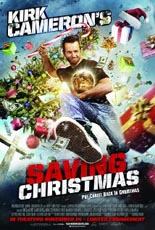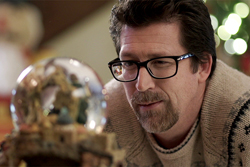
 True or false: The movie Saving Christmas begins with a three-minute lecture to the audience from Kirk Cameron.
True or false: The movie Saving Christmas begins with a three-minute lecture to the audience from Kirk Cameron.
The answer is “false.” It takes up four.
In that prologue — scooch, Alistair Cooke! — the erstwhile ’80s teen heartthrob of TV’s Growing Pains sits in front of a glorious fireplace next to a glorious Christmas tree in a glorious living room and, with awkward pauses to sip from a glorious prop mug, relays all that he appreciates about the most wonderful time of the year: “I love the cookies. I love the fire. I love the fudge. … And I love hot chocolate!” he exclaims. “But some people want to put a big, wet blanket on this.”
Yes, Virginia, Cameron’s talking about the nonexistent “war on Christmas.” And he’s here to narrate and star in a high-definition sermon all about it. Playing himself (and producing), Cameron attends a glorious Christmas party for wealthy people at the glorious home of his big sister (real-life sibling Bridgette Ridenour). The problem — other than Sis’ apparent addiction to Hobby Lobby kitchen decorations — is that Kirk’s brother-in-law with the punchable face (the movie’s writer/director, Darren Doane) isn’t feeling the spirit; he just can’t get over all the people partying because he’s too busy moping about how Christmas trees and Santa Claus aren’t in the Bible, for God’s sake.
 True or false: The bro-in-law’s character name is Christian White. The answer is “true”; I’m guessing Christian Aryan was deemed too on-the-nose.
True or false: The bro-in-law’s character name is Christian White. The answer is “true”; I’m guessing Christian Aryan was deemed too on-the-nose.
I won’t fault the Liberty University-funded Saving Christmas for its religious beliefs — not even the one justifying material things as being “right.” I fault Saving Christmas because it’s lazy and deceitful. Narrates Cameron toward the beginning, “Stories are tricky things,” which must be why Doane didn’t adorn his project with one. For an hour, Kirk and Christian sit in a car while the former reassures the latter that the Christmas symbols he worries about are indeed holy. Then they rejoin the party so a hip-hop musical montage (complete with Doane breakdancing) can extend the running time into a feature; Kirk jumps in to scream, “Let’s feast!”; the end.
That’s not a plot; that’s a commercial, essentially for itself. (Choir, you have been preached to!) I feel sorry for well-meaning people who paid good money to see “wholesome family entertainment” and soon realized they were hoodwinked into an audiovisual presentation, considerable stretches of which have no movement in them — just inanimate objects shot from rotating angles. If Doane’s digital camera and editing equipment didn’t allow for scenes in slow motion, Saving Christmas would be half the length, but interminable all the same.
Thou shalt not laugh, either, because Doane’s idea of comedy is summed up by an end-credit “blooper” in which the stereotypical black friend improvs, “I’m just gonna keep talking and move my hands until your camera gets what it needs.” Hell, even Cameron’s 2008 hit Fireproof is more accidentally funny.
True or false: I can achieve the same wonderful feeling that Saving Christmas wishes to espouse from Bill Murray’s epic monologue at the end of Scrooged. The answer is “true.” And I can get legitimate jokes with it! —Rod Lott
